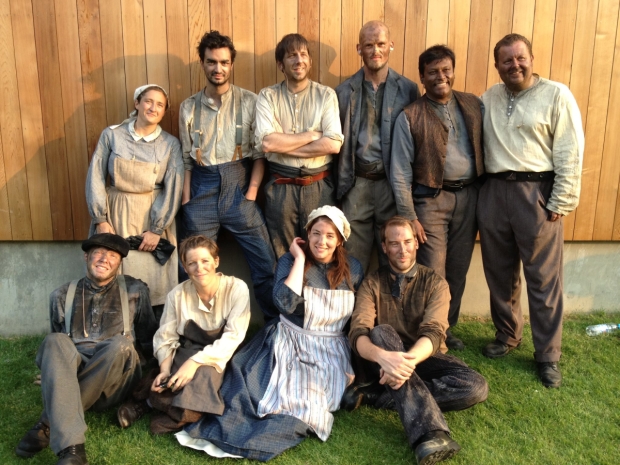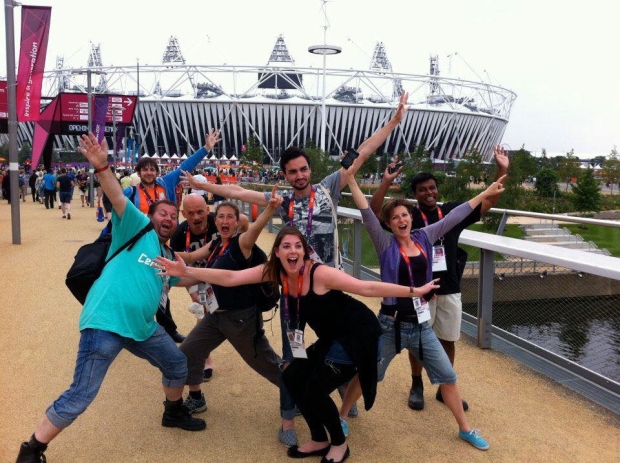Guest Blog: I performed in the Olympics Opening Ceremony
Mel West is the Head of Drama and a teacher of English at a secondary school in Hampshire. Having devoted the past eight years to directing thousands of young people in school productions, the Olympics Opening Ceremony was her opportunity to take to the stage in her own right.
Here, she gives us an inside eye on what it was like to take part in Danny Boyle's epic production, which was watched by billions worldwide.

© Mel West
Last Friday night as the sun set over East London, a thousand working men and women, liberally coal-dusted and attired in itchy worsted, made their incongruous way through the immaculately manicured Olympic Park towards a waiting crowd of 80,000.
We knew that our friends and family would be sitting at home, straining to pick us out of the melee, and that billions around the world would be waiting to see how we measured up to the clean, precise showmanship of Beijing. We were full of confidence, excitement and patriotism, bursting to share the secrets of our three months of rehearsal.
Danny Boyle had whipped us into a frenzy, telling us that we represented "the best of" the Olympics, that volunteers and ordinary citizens were what it was all about. We adored him, and lapped it up. We’d show them how talented we were, how extraordinary Britain’s history was, and what a few thousand volunteers with 100 hours of rehearsals could achieve.
We became experts at sitting around and waiting to be told what to do.
It hadn’t always been this way. Our early rehearsals had taken place on a patch of waste ground near the Ford plant in Dagenham where the only audience was the speeding traffic of the A13. Two stadium-sized spaces had been created for us to rehearse our scenes and throughout May and June a thousand of us would gather every weekend, clad in fetching khaki overalls and numbered bibs, to be briefed en masse in an enormous big top tent. ("That’s why there’s no Glastonbury this year," one woman confidently informed me. "We’ve got their big top.")
Steve Boyd, mastermind of countless global ceremonies and God-like in our eyes, would inform us of the inevitable changes that had been made since last time. It was clear from the off that this was a work in progress, and that no one was entirely sure how we were going to industrialise the green and pleasant land in seven minutes. "You will always outnumber us!" he would cry good-naturedly, in a bid to get us to behave. "Hustle up!"
We soon became expert at sitting around and waiting to be told what to do whilst swapping stories with our new-found friends. First loves, coming out, family breakdowns and work tales all tumbled forth. We made entertainment where there was none, recreating the life of Steve Boyd in interpretive dance and initiating a ‘who can stand on one leg the longest’ contest.
Every so often a breakthrough would occur, like the moment when Mez, the wonderful mass movement coordinator in charge of my county, called three of us out. "One, two, three… you’re my first three ratchets. It’s an acting role, so don’t show the others how excited you are," she begged pointlessly as we high-fived and bellowed for joy. "We get to ratchet!" we screeched, like starving children sharing a wafer. "I don’t know what a ratchet is but I’m going to ratchet like no one’s ever ratcheted before! Give me stuff to ratchet and I’ll do it!"
Little did we know that ratcheting, which basically involved moving a lever back and forth in pretence of raising a chimney from the ground, was going to become the most hotly contested task in the whole of the county. I clung on to my ratchet role doggedly for weeks until, having had our numbers cruelly slashed from twelve to eight, someone else managed to sneak in with two weeks to go and oust me. I comforted myself with the knowledge that I had the moral victory, but of course, that didn’t get me on TV.
After five weekends in Dagenham, we felt we were getting there. Yes, we were using tarpaulin instead of turf, and yes, most of us still had no real idea what was going on, but we trusted that Steve and Danny had the higher vision. We arrived, full of anticipation, at the Olympic Stadium on Saturday 23 June to find the green and pleasant land spread before us in all its glory. There was a huge buzz of excitement as we started our first real strike, until we tried to move the turf. Boy, the turf was heavy. Struggling and sweating, we eventually managed to clear the field of play in about half an hour. "You guys are just so inspirational," Steve enthused in our in-ear monitors. "Now, we’re going to put it all back so we can do it again! Hurray!"
I nearly quit a million times – I sacrificed time, money, my social life, my family…
Despite the rain, the waiting, the tiredness and the turf, it was always the human element that got us through. Our beloved mass movement coordinators, Mez and Claira, were responsible for getting 190 of us to turn up every weekend to move some really heavy stuff in a vaguely artistic way, and we all respected and marvelled at their ability to deal with the enormity of their task. Unfortunately we all tried to help them: you could guarantee that at any one moment at least 189 of us would have a better idea of how it would work, and wouldn’t be able to resist chipping in. Meanwhile Polly, our dance captain, was tasked with getting us all to walk on the beat. "Watch me," she would say. "Da da da da da da…" Dutifully we would march on the spot, perfectly in time, before getting back onto the field of play and once again wandering around haplessly like befuddled tourists.
I nearly quit a million times – I sacrificed time, money, my social life, my family and my ability to function at work on Mondays – but there were two main reasons why I didn’t. One was that I couldn’t have left the friends I’d made. We were in it together, and we were in it to the end. The other was that my friends and family simply wouldn’t let me. "I’ve told everyone I know that you’re in the Opening Ceremony!" vague work acquaintances would call down the corridor. "We were discussing you over Sunday lunch!" another would cry. I had become a poster-girl for people who bother to try, and defeat would not be tolerated.

© Mel West
The final week was magical. Eton Manor, our cast holding area, was bathed in sunshine and there was a festival atmosphere as we all sat around in our miscellaneous costumes, David Bowies mingling with coal miners and immaculate 1940s nurses. After each dress run we hugged and danced and cheered at our own brilliance. I found myself wearing my ‘Cast accreditation’ badge from the moment I left home in Hampshire, full of pride at my involvement.
We went to it as if our lives depended on it.
Danny Boyle was as accessible as ever, visiting us as we prepared for our dress rehearsals and taking the time to sign autographs and shake people’s hands. The sense was there, as it had always been, that this was a labour of love for him and that the message he was conveying through our segment came from the heart. As a Lancashire boy himself, an area where my own grandparents worked in the mills, he told us that "people like me can read and write because of the Industrial Revolution". He made sure that we understood that we represented real history, and most importantly "the people that do the work." As a speaker, he was inspirational. Whenever we had been wet and cold and tired, he had always been on hand to refocus us, share the greater vision and keep us motivated to work just that little bit harder.
Friday was one of those days when things just seem to fall into place and everyone you meet is in love with the world. As we made our way to the stadium for the last time, pausing to watch the Red Arrows splash our national colours across the sky, we kept reminding ourselves that this was a moment we could never capture in a photograph or fully explain to our friends, we just had to be in it, here and now, and try to hold onto it in our hearts and minds.
The tension as we waited to go on was electrifying. The soaring strains of Nimrod greeted the arrival of the Brunels, and as we heard Evelyn Glennie beat out the opening rhythms of our symphony of destruction all our focus went towards the task at hand. We went to it as if our lives depended on it. As our music paused for the moment of remembrance a dreamlike stillness descended, and I was fully aware for the first time of the crackle of excitement from the crowd around us. As we picked up the pace for the final demolition, and turned at last to see the sparks showering from the rings above our heads, more than a few tears were shed. I felt close to drowning in the roar of the crowd and all of our steely, industrial determination melted into smiles of triumph and pride.
We skipped off up the steps, being hugged and high-fived by overwhelmed audience members and applauded by all the volunteers and workers we passed. As an added bonus a few of us managed to watch the rest of the show from the side-lines before partying through the night and slinking home as the sun came up. Yes it was hard work, an act of faith in many ways, but also the biggest high of my life and, in all of our eyes at least, we had definitely been a part of the Greatest Show on Earth.










